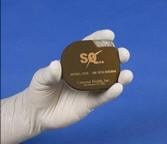
March 22, 2010 – A pivotal clinical trial recently began to gain U.S. approval for a defibrillator system that does not have any leads in or on the heart. Additionally, no imaging equipment is required for placement of the system, since all of the components are positioned using anatomical landmarks.
Conventional ICD’s require placement of at least one lead in or on the heart. Most frequently they are threaded through a vein and then placed inside the heart. These conventional transvenous leads allow for sensing of the heart’s rhythm and delivery of a life saving electric shock when a harmful arrhythmia is detected. The surgical placement and long-term implantation of these transvenous leads are associated with a significant proportion of the complications related to this therapy. In contrast, the Cameron Health Subcutaneous Implantable Defibrillator (S-ICD) System resides just under the skin, potentially avoiding many of these lead complications.
The trial is a prospective, multicenter, single-arm design approved by the FDA under an investigational device exemption (IDE). The company plans to enroll up to 330 subjects at up to 35 sites globally. The study has primary clinical endpoints of arrhythmia conversion efficacy and complication free rate at six months for patients at risk of sudden cardiac arrest (SCA).
The IDE trial will involve patients at centers in the U.S., Europe and New Zealand. The first IDE implants were performed in New Zealand by Dr. Margaret Hood at Auckland City Hospital and by Dr. Ian Crozier at Christchurch Hospital. Initial implants in the U.S. were performed by Martin Burke, M.D., director of the Heart Rhythm Center at the University of Chicago.
“Given the simplicity of the implantation I can see the potential to reduce the surgical and long term complications inherent in transvenous ICD systems,” Dr. Burke said. The first U.S. patient to receive Cameron Health’s S-ICD System was Brooke Bergeron, 38, who suffered a heart attack during the birth of her fourth child. Her doctors recommended an implantable defibrillator due to heart damage that put her at risk for SCA.
Components of the S-ICD System include the SQ-RX Pulse Generator, Q-TRAK Subcutaneous Electrode, Q-GUIDE Electrode Insertion Tool and the Q-TECH Programmer. The S-ICD System is implanted subcutaneously (just under the skin) with the electrode running parallel and slightly to the left of the sternum. While most functions are automatic, adjustments and data retrieval can be easily achieved through a highly advanced integrated programming system developed specifically for the S-ICD System.
The S-ICD System received CE approval in 2009 and is commercially available in Europe.
For more information: www.cameronhealth.com


 January 05, 2026
January 05, 2026 









